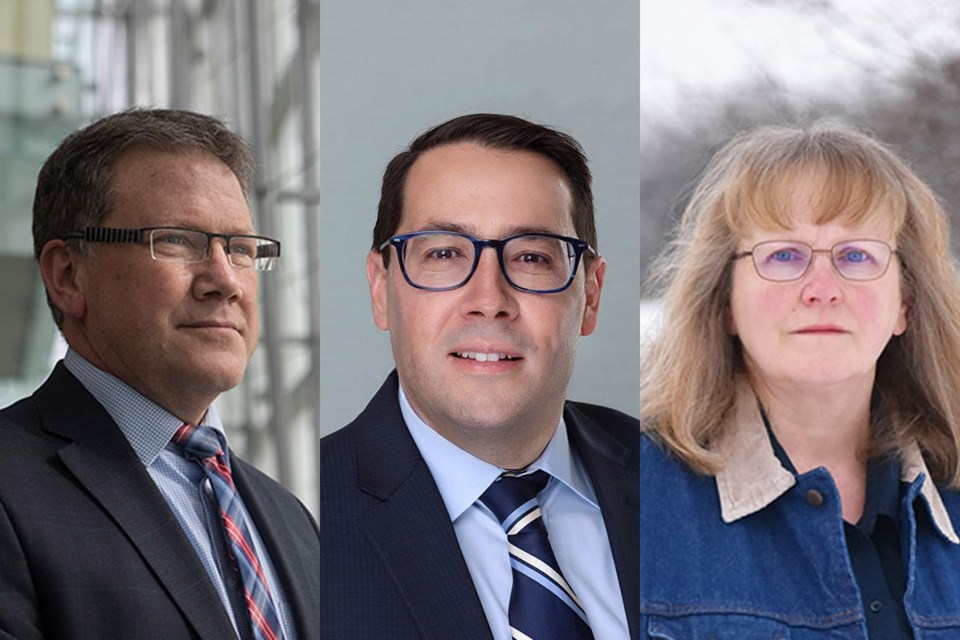SASKATOON – Three University of Saskatchewan (USask) leaders and researchers have been inducted as fellows into the Canadian Academy of Health Sciences (CAHS): Dr. Volker Gerdts (DVM, PhD), Dr. Walter Siqueira (DDS, PhD) and Dr. Cheryl Waldner (DVM, PhD).
“We congratulate these exceptional scholars, who exemplify USask’s strength and diversity in health research,” said USask Vice-President Research Baljit Singh. “Their leadership unlocks the creativity, innovation and community potential of interdisciplinary exploration.”
The Canadian Academy of Health Sciences (CAHS) is one of three national academies that comprise the Council of Canadian Academies, the highest honour granted to scholars in Canada. (The other two CCA academies are the Royal Society of Canada and the Canadian Academy of Engineering.) Fellows of the Academy are elected based on their demonstrated leadership, creativity, distinctive competencies and commitment to advancing academic health sciences.
A total of 73 new fellows were inducted to the CAHS Sept. 13.
Dr. Volker Gerdts
Gerdts is the director and CEO of the Vaccine and Infectious Disease Organization (VIDO) at USask and is internationally recognized for human and animal vaccine development. Prior to becoming director, Gerdts was a research scientist and associate director of research at VIDO.
Under his direction, VIDO is playing a leadership role in Canada’s COVID-19 research response. In addition, the organization is establishing itself as Canada’s Centre for Pandemic Research. Gerdts has over 150 publications, secured more than $225 million in funding, and given more than 250 media interviews and presentations during the COVID-19 pandemic.
“I am honoured to become a member of the CAHS; this is a great recognition of the team effort at VIDO,” said Gerdts. “I am pleased to work with the Academy to developing strategies for Canada to better prepare for the next disease outbreak.”
Dr. Walter Siqueira
Siqueira, a professor and associate dean in the College of Dentistry, is internationally renowned for his expertise in saliva. Siqueira leads the Salivary Proteomics Research Laboratory at USask, a research program unique in Canada and one of only a few in the world.
Siqueira's scholarship account with over 100 publications, an h-index of 41, research funding totaling more than $9 million, and supervision of eight post-doctoral fellows, 20 graduate students, numerous undergraduate, and 26 visiting students.
In addition, Siqueira is highly involved with the Canadian Association for Dental Research — acting as president between 2019-2021— as well as other national and international oral health research organizations.
Siqueira said, "To date, only 11 dentists have been elected as a member of the CAHS. This is without question a major milestone in my career as both an academic and scientist."
Dr. Cheryl Waldner
Waldner, a professor in the Western College of Veterinary Medicine’s (WCVM) Department of Large Animal Clinical Sciences, was officially accepted as a Fellow of the Canadian Academy of Health Sciences on Sept. 13.
Waldner’s three-decade career has improved herd health, beef production and antimicrobial stewardship for beef cattle. Waldner’s research has attracted more than $26.6 million in funding. In 2020 Waldner was named the NSERC/BCRC Industrial Research Chair in One Health and Production-Limiting Diseases, leading a five-year beef cattle health productivity research program with $2.35 million in Beef Cattle Research Council (BCRC) and federal support. She’s also co-leader of the $5.6 million Genomic ASSETS for Livestock project.
Waldner has more than 250 peer-reviewed publications, 6,000 citations and h-index of 40. She’s supervised four post-doctoral fellows and 14 PhD students, in addition to numerous master’s students, research associates and summer students.
“It’s an honour to be included in this group of scientific leaders who are dedicated to the betterment of health for all. Animal and human health is intrinsically linked, and I’m grateful to be recognized for my commitment to improving the health and lives of both animals and people,” Waldner said.




